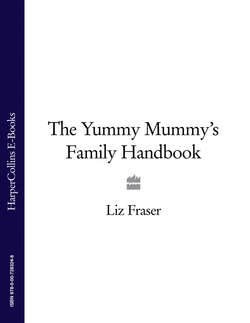Читать книгу The Yummy Mummy’s Family Handbook - Liz Fraser - Страница 7
Clash of the Tartans: Bringing two Families together
ОглавлениеOne day you marry a guy, and you become husband and wife. Or you don’t marry the guy, but live with him long enough to know every hair on his stubbly chin, every album he’s ever owned and when it’s best not to tell him that he’s making a pig’s ear of some DIY. So far so as-it-should-be: you like him, he likes you, and life is rosy.
But then you go and spoil it all by saying something stupid like, ‘Why do you always have tea before breakfast? We never did that in my family—we always had tea with breakfast, which is much better.’ Aaargh! Why did you say that? Why should he care two hoots when your family—that’s your family, not his—takes their tea, or that you think your way is better?
Well, he shouldn’t, of course, and probably doesn’t, but the point is that you do. Or, at least, you might not care all that much about the tea thing, but about a great many other small but habitual, ritual or comforting things that your family always did as you grew up, and that you think you’d rather like to carry on doing now, thanks very much, so let’s stop this ridiculous tea-all-over-the-bedclothes lark and get up!
Bringing two families together is always bound to throw up this kind of dispute, and many far more serious ones. Everything from what time you get up on a Sunday morning to what you have for lunch (Sunday roast or beans on toast), how much telly you watch, where you go for Christmas, how to do DIY, whether women with kids should have a job and what kind of school you send your little angels to, is in some way influenced by your own family upbringing.
Christmas is a classic situation for conflict:
Christmas Day 2003
I want to go home. I feel like an alien here: nothing is as it was at Christmas when I was a child and it doesn’t feel Christmassy to me at all. I want to be with my mum and dad right now, not with someone else’s family. I know they’re my family now too, but it’s not the same at all. I feel I have to ask at every turn, in case I do something which isn’t traditional here, and it’s really getting to me now.
Even in the most welcoming, adaptable, easy-going family there is bound to be some friction and even the occasional explosion, so it’s best to be prepared:
Don’t assume your way is right. Many people fall into the trap of always assuming that if their way works, or has been handed down through even one generation, it is the Right Way, and everyone else is sadly misguided or stupid. Avoid wearing this arrogant, highly unflattering hat by keeping your eyes open for new and possibly better ways of living.
Do some detective work. It’s much easier to spot any potential clashes if you have studied your partner’s background and rituals carefully. If no woman in his entire family has ever had a job, and has started child-bearing within six months of her wedding, then you might be foolish to assume he thinks any other way. It’s unlikely that you’ve settled down with somebody who has wildly different views on life from your own, but it’s often the little things that grate as badly. Learning about his family’s traditions and habits will make it much easier to understand when he starts doing things that annoy you, like leaving the dishcloth wet after he’s used it. Grrr!
Spot the problem before it becomes one. (This is illogical, I know, but you know what I mean.) It’s much better to talk about anything you find annoying or impossible as soon as you spot it. Once things have been left to take a hold they are very hard to stamp out. Separating whites from coloureds in the washing machine was a case in point in our house: I managed to get this unthinkable practice wiped out within the space of two spin cycles.
Compromise. If you are both really set in your ways it can be very difficult to come to any kind of agreement and the only way forward is compromise. Do things his way one weekend and your way the next. Alternate festive traditions every year. Let him have the final say in naming one child, and you the next. And so on. What you may find is that, very slowly, you let go of some of your habits, which you thought you couldn’t live without, as you find that you actually can.
Keep it friendly. The clash of two families coming together can be, if not bloody, then certainly quite messy. Somebody is bound to get hurt if you let things get too personal and critical. Be sensitive; remember that you are two people coming together from different backgrounds, philosophies and ways of hanging the washing—and something’s gotta give. You can’t expect your egos to remain bruise-free but you can avoid any major injuries to your relationship by joining ranks and staying on good terms. Maybe your habit of leaving the cucumber end uncovered could be one you leave behind…?
Stick to your guns. There is more about this in the Guest Bedroom (see page 316), where we meet the in-laws and your Mum and Dad, but it’s worth noting here that the two of you should never, ever do things in your new family because of pressure from your respective parents. Listen to them, consider their advice, but do what the two of you feel is right for you. It may hurt them, offend them or just baffle them, but it’s your life, and you do with it what you like. Home education it is, then…
